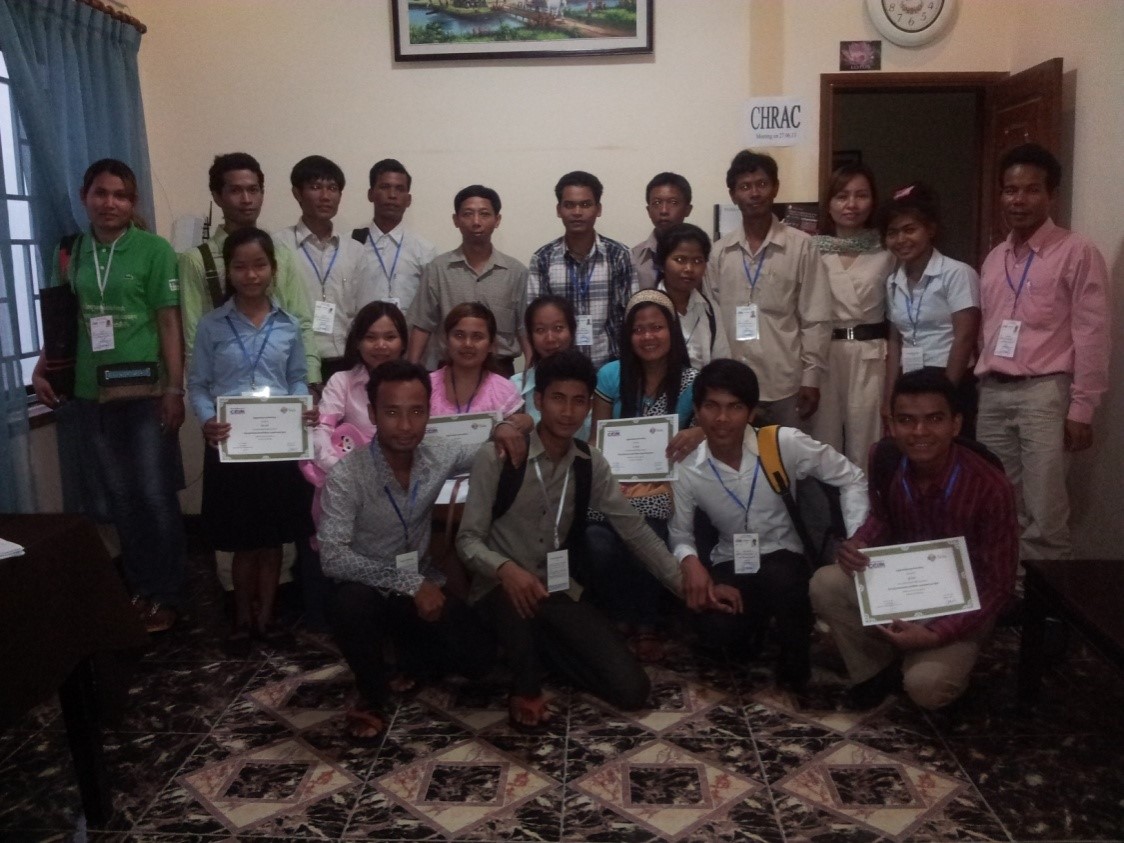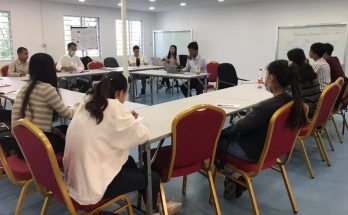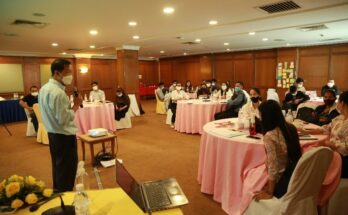Well prepared of the citizen journalists to cover the election on 28th of July and the campaign that starting from 27th June to 26th July, were indicated as the main goal of the training on basic reporting on election. To ensure this will be done correctly, part of the training focused on what the journalists wanted to cover and different methods they could use. To provide the best possible outcome, CCIM gave each journalist with a smartphone and taught them how to use different apps to cover and report on election and other news more efficiently.
Sun Narin, online news editor and one of the trainers at the ICT–training, explains that thanks to the second training, all the citizen journalists understood more about basic news writing and were more active in taking photos, videos and posting on social media sites. Now they are aware of true journalism and can distinguish between biased and unbiased forms of writing. He strongly hopes that they will utilize these new teachings to report on the issues within their own communities and especially on the election happening at the end of July.
“This training is important because my community is far away, not all can be covered from other journalist, so now I can cover what happens in my province. By this training I can positively change the behavior of my community and teach them how to be more proactive.”
21 year old Sok Sreyneng, from the Mondulkiri province.
The training also consisted of a study visit to the VOD studio, where the citizen journalists got to ask questions about VOD as a media organization. They got a first-hand look at how everything worked, from the editorial meeting to the live broadcast.
Between the 23rd and 27th of June 2013, the second training of citizen journalists was conducted by CCIM as a part of the Information Communication Technology project. During the training a total of 21 citizen journalists coming from 11 different provinces participated, amongst 24 journalists from 12 targeted provinces: Koh Kong, Preah Vihear, Banteay Meanchey, Pailin, Svay Rieng, Pursat, Kampong Chhang, Rattanakiri, Mondulkiri, Kratie, and Stung Treng. The journalists were selected by CCIM management committee according to their knowledge on the issues in their communes and their ability to report and use mobile technology to alert media about the event or news which is happening nearby their community.
The objectives of the project were to ensure that the citizen journalists could collect visual and audio data, to be able to report immediately and raise alertness via secure live-streaming, audio and visualization tools.
To meet the objectives, different training methods such as lectures, Q&As, group projects, and study visits were used. The training started on Sunday the 23rd of July, a follow-up to the first ICT-Citizen journalist training, to ensure that everyone was capable at using Facebook and Gmail. Furthermore, we taught the basics on how to write, interview, and write longer stories. On the 24th of July, the Citizen Journalists were to cover and report about a conference held by CCIM on “Voice the requests of citizens ahead of the National Assembly Elections”.
During the five day training session, several guest speakers taught the citizen journalists about the election in general, how to report through a mobile device, how to report safely, journalism ethics and the laws protecting the rights of the reporting journalists. CCIM had invited the following guest speakers to hold lectures: Mr. Soun Yuthyia,(the Legal officer at Comfrel) who taught about election, Mr. Nhim Sakhorn (reporter from Voice of Democracy) who taught about mobile reporting, Mr. Mak Chanden, (production chief from Voice of Democracy) who taught about journalism ethics and Mr. Sok Sam Oeun, a lawyer, who taught about how to report safely and legally.
All of the citizen journalists have committed to cover the election campaign and election day, and with the newly provided smartphones, knowledge and interview techniques, stronger and more thorough reports will hopefully be produced.
After evaluating the training, the plan for the citizen journalists is to cover irregularities during the election campaign and on the Election Day in their community where other journalists cannot go. The citizen journalists will report stories based on their individual communities about how the party’s policy can change people’s opinion and their decision. They will be able to interview people who don’t have their name or have problem with voting. A major benefit of this training is that the citizen journalists will stand at the election stations the whole day on the Election Day. This means that more reports will be produced and sent to be published by CCIM, VOD, as well as other organizations. The results of the training were that everyone learned how to use their Gmail account and 95 % learned to use Facebook. According to the training evaluations, a majority are now able to report through different channels, which will help to increase and improve reports collected during the election campaign and especially on the day of the election.
The reports, photos and videos collected by the citizen journalists will be monitored and evaluated throughout the election campaign to ensure a successful training.
Interview with Kim Seng, 47 years old from Kampong chhnang province:
How do you think it is has been joining this training?
The training is very important for a citizen journalist like me. This training provides a lot of knowledge on how to send SMS, take photo and how to use my smartphone. The citizen journalists can use this training to practice covering news and sending it to the media. Most importantly this gives us an opportunity to express our problems to the government. Then a solution can hopefully be provided. This training is the best one, because I’ve never tried all of this before. I am amazed at how fast a smartphone works.
Do you think you have learned a lot about how to cover the election?
I feel very confident in how to cover the election, but there are still things I find difficult. We will have a lot of stories, because the training is at the same time as the election campaign. It is good, that we can go and interview people to collect information about the election. We can contribute to help the country by reporting irregularities throughout the campaign and on the Election Day. We will now be able to the compare actual facts with the statistics we see from the media.
Do you feel qualified to cover your province and send in reports through your smartphone, facebook and/or gmail.?
Yes, I do feel qualified to live up to my new responsibilities.
Why do you think it is important to conduct this training?
We have to follow the technology, and this training can do that for citizen journalists. We can send information faster and safer. We have to be updated with the technology. It is important to change normal citizens into citizen journalists, so that maybe one day we might have the opportunity to become a professional journalist. I hope CCIM continues this project so me and future citizen journalists as well, can learn more. Also, when someone wants to violate our rights, we know we are under the protection of certain laws. Last but not least, I’m happy to get this opportunity to live up to the expectations CCIM has for us.




